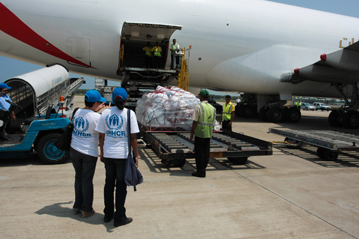UNHCR coordinates aid to 26,000 Central African Republic refugees
UNHCR coordinates aid to 26,000 Central African Republic refugees

GENEVA, 7 August (UNHCR) - The UN refugee agency announced it is coordinating an operation on Wednesday to bring help to some 26,000 refugees who fled insecurity in the Central African Republic and are now living in precarious conditions scattered along the eastern border of Cameroon.
The refugees, from western and north-west CAR, are mainly Mbororo nomadic cattle herders who arrived in waves since 2005 in the east and Adamaoua areas of Cameroon. They fled their villages because of insecurity and relentless targeting by rebel groups and bandits who steal their cattle and kidnap women and children for ransom.
"Most of the Mbororos crossed the border on foot carrying their few remaining possessions," said UNHCR spokeswoman Jennifer Pagonis. "A small number managed to save their cattle, others lost everything. The last recorded arrivals were in February this year."
UNHCR is coordinating the relief operation, which includes the World Food Programme (WFP), UNICEF and UNFPA. There are a number of logistical challenges in getting aid to the refugees, who are in more than 50 sites spread over thousands of square kilometres along the border with CAR in the departments of Mbéré (in Adamaoua), Lom and Djerem and Kadei.
"The imminent start of the rainy season may also hamper the delivery of relief supplies, and there are security concerns over banditry," Pagonis said.
UNHCR is sending more than 200 tonnes of basic supplies such as blankets, plastic sheeting, mosquito nets, hygiene supplies and medicines to the refugees. The refugees, particularly women and children, are in a vulnerable condition with some 15-18 percent of infants malnourished and suffering an infant mortality rate six to seven times higher than the emergency threshold in other areas.
Along with our operational partner, CARE Canada, UNHCR is supplying medicines to 32 health centres in the regions where the refugees are living. WFP is positioning 2,997 tonnes of food rations in its warehouses to supply the basic food needs of the refugees for six months. UNICEF is supplying needs for children suffering malnutrition.
Cameroonian Ministry of Health teams will work with the agencies on distribution and carry out an urgent vaccination campaign for children up to 15 years old. UNFPA will be helping women and young girls with problems related to reproductive health and maternal mortality.
In March, UNHCR opened a new field office in the eastern Cameroon town of Bertoua, some 400 km east of the country's capital, Yaoundé, to start assisting the Mbororos. We have taken part in a number of joint assessment missions with the government and other UN agencies to Adamaoua province and other areas bordering CAR.
The government of Cameroon, in line with its national refugee law adopted in July 2005 and the 1969 OAU Convention, has recognized this population as prima facie refugees.









